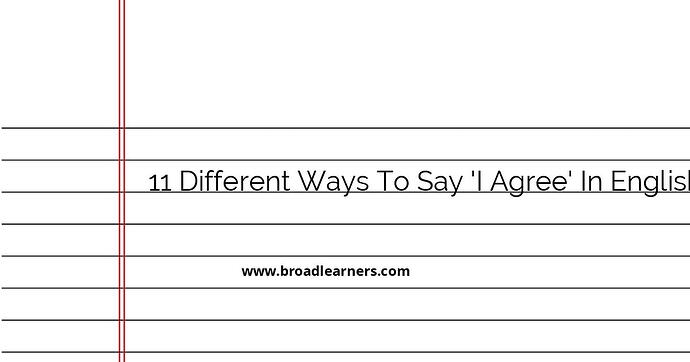When engaging in conversation or discussion, it is common to express agreement with the opinions or statements of others. Instead of simply saying 'I agree' every time, it can be helpful to have a variety of phrases to choose from. This not only adds variety to your language but also shows that you are actively engaged in the conversation. Here are eleven different ways to say 'I agree' in English:
- I concur
- That's right
- Exactly
- Absolutely
- Definitely
- Without a doubt
- Agreed
- For sure
- You're right
- I couldn't agree more
- That's spot on
Let's explore each of these phrases in more detail, along with example sentences:
1. I concur
'I concur' is a formal way of saying 'I agree.' It is often used in professional or academic settings. For example:
During the meeting, I concur with John's proposal to revamp the company's marketing strategy.
2. That's right
'That's right' is a simple and informal way to express agreement. It is often used in casual conversations. For example:
A: The concert starts at 8 PM. B: That's right!
3. Exactly
'Exactly' is a concise way to show complete agreement with someone's statement. It is commonly used in both formal and informal situations. For example:
A: The movie was amazing. B: Exactly! I loved every minute of it.
4. Absolutely
'Absolutely' is a strong and emphatic way to say 'I agree.' It adds a sense of certainty and conviction to your agreement. For example:
A: We should go hiking this weekend. B: Absolutely! I've been wanting to explore the trails.
5. Definitely
'Definitely' is a confident way to express agreement. It shows that you are completely sure about your agreement. For example:
A: The new restaurant in town is fantastic. B: Definitely! I had the best meal there last night.
6. Without a doubt
'Without a doubt' is an expression of strong agreement. It emphasizes that there is no uncertainty or hesitation in your agreement. For example:
A: The team played exceptionally well in the match. B: Without a doubt! They dominated the game from start to finish.
7. Agreed
'Agreed' is a simple and straightforward way to show agreement. It is commonly used in both formal and informal conversations. For example:
A: We need to prioritize customer satisfaction. B: Agreed. It should be our top focus.
8. For sure
'For sure' is an informal way to express agreement. It is often used in casual conversations among friends or peers. For example:
A: Do you want to grab dinner later? B: For sure! Let's try that new Italian restaurant.
9. You're right
'You're right' is a way to acknowledge that the other person's statement or opinion is correct. It is often used in friendly discussions. For example:
A: The weather today is beautiful. B: You're right! It's the perfect day for a picnic.
10. I couldn't agree more
'I couldn't agree more' is a strong way to express complete agreement with someone's statement. It emphasizes that you not only agree but also share the same level of enthusiasm or conviction. For example:
A: This book is a masterpiece. B: I couldn't agree more! It's brilliantly written.
11. That's spot on
'That's spot on' is a colloquial way to express agreement, indicating that the other person's statement is completely accurate or correct. It is often used in informal conversations. For example:
A: The solution to the problem is to increase communication. B: That's spot on! Improved communication will definitely help resolve the issue.
These phrases will help you express agreement in a variety of situations. Remember to choose the appropriate phrase based on the formality of the conversation and the level of agreement you want to convey. Practice using these alternatives to 'I agree' to enhance your communication skills.
Did I miss anything? Respond below
